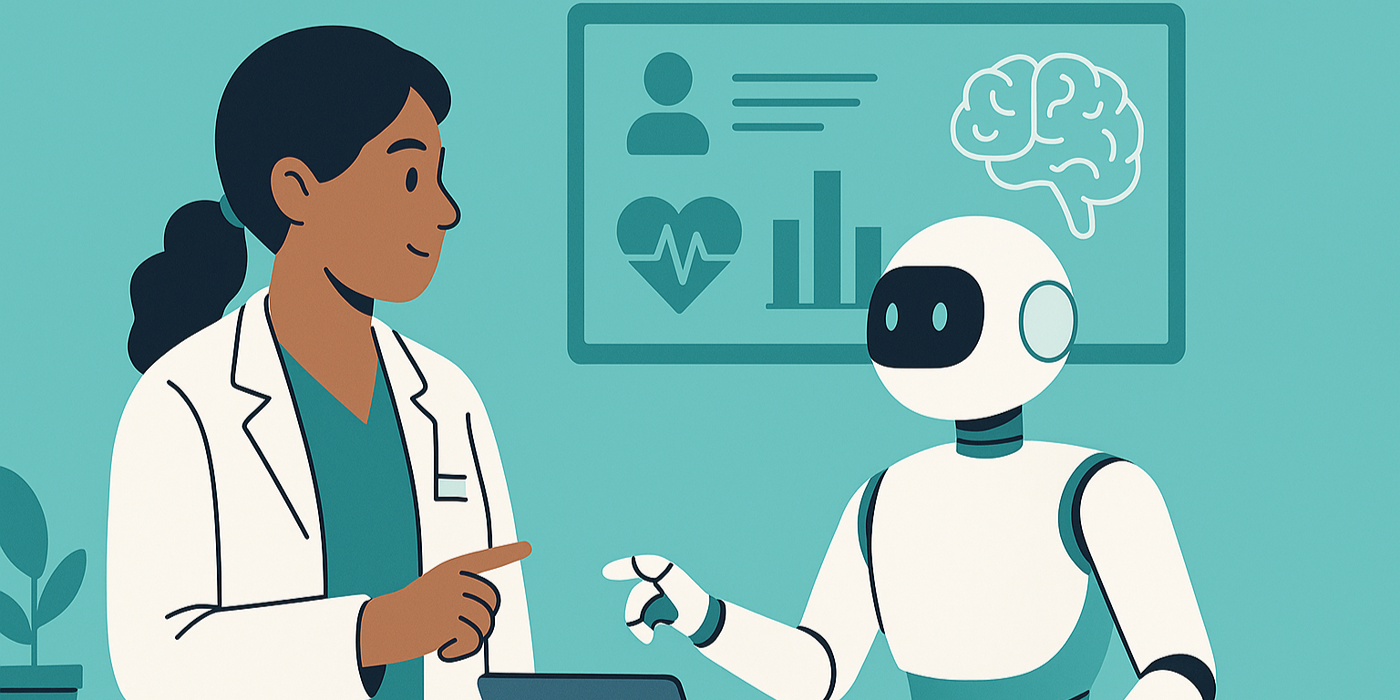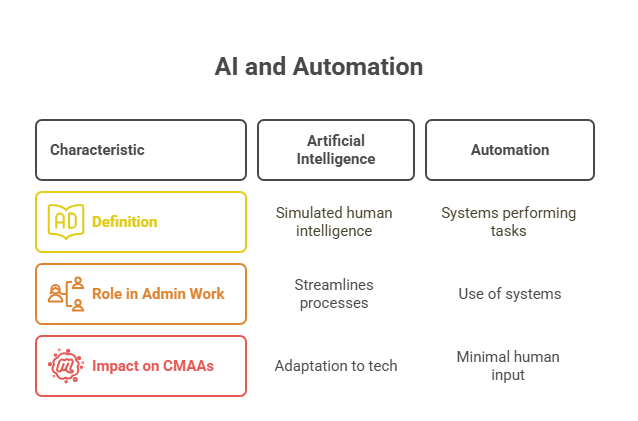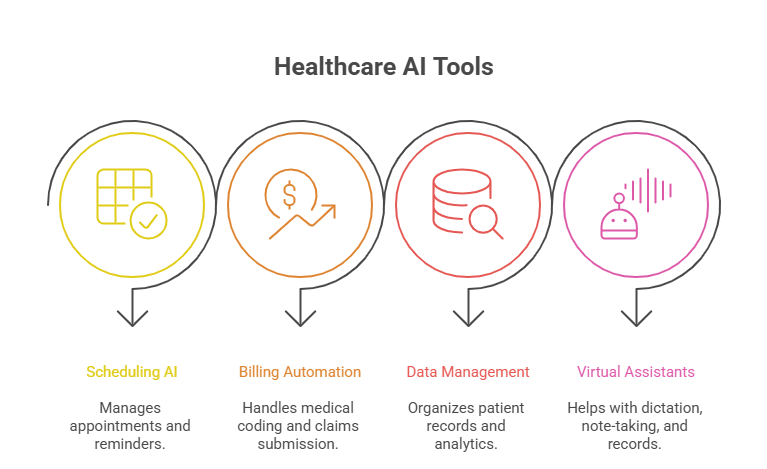AI & Automation in Medical Administration: What CMAAs Must Know
The future of medical administration is no longer manual. As AI and automation redefine healthcare, Certified Medical Administrative Assistants (CMAAs) are at the center of this shift. From scheduling appointments with predictive precision to handling billing tasks in seconds, AI is transforming how front-office efficiency works. For CMAAs, staying relevant means adapting to this intelligent ecosystem—fast.
But it’s not just about learning new software. It's about understanding how AI-driven workflows reduce administrative overhead, elevate patient experience, and slash operational costs. Clinics and hospitals now expect CMAAs to manage both traditional tasks and tech-powered systems—simultaneously. That’s no longer a bonus—it’s baseline. If you're a CMAA, or training to be one, this guide gives you the exact blueprint to navigate, leverage, and grow with AI in healthcare administration.
What is AI and Automation in Medical Administration
Artificial Intelligence (AI) in medical administration refers to software systems that can perform tasks traditionally handled by humans—only faster, more accurately, and at scale. This includes processing patient data, managing schedules, handling billing, and triaging administrative tasks using logic-based algorithms and predictive analytics.
Automation, on the other hand, uses pre-set rules and workflows to streamline repetitive actions. For CMAAs, this might mean automatically confirming appointments, generating follow-up reminders, or routing insurance claims based on predefined criteria.
What makes AI unique in this space is its ability to learn and improve over time. For instance, machine learning tools can analyze thousands of patient interactions to identify bottlenecks in clinic workflows and suggest optimizations. This adaptive capability helps reduce inefficiencies and improve service delivery in real time.
Together, AI and automation don’t replace CMAAs—they augment them. They eliminate grunt work, allowing CMAAs to focus on high-value human tasks, like patient interaction and compliance. With the healthcare industry's digital transformation accelerating, understanding these technologies is critical for anyone in medical administration aiming for long-term career growth.
Benefits of AI & Automation for CMAAs
Time and Cost Efficiency
AI tools streamline administrative workflows that typically consume hours of manual effort. Automated systems can schedule appointments, verify insurance, and process billing with minimal human input—cutting overhead costs significantly. For CMAAs, this means more time for patient-facing responsibilities and fewer overtime hours due to tedious data entry.
Reducing Human Error
Even a single administrative mistake can lead to billing delays or compliance issues. AI minimizes these risks by standardizing data input, detecting anomalies, and flagging inconsistencies before they escalate. In high-volume settings like hospitals, this translates to more accurate records and fewer disputes with payers or patients.
Improving Patient Experience
Patients today expect convenience and speed. AI systems allow for real-time appointment booking, digital form completion, and automated follow-ups—all of which reduce wait times and enhance satisfaction. CMAAs who leverage these tools can deliver a seamless front-desk experience that keeps patients engaged and loyal.
Key AI Tools for Medical Administration
AI for Scheduling and Appointment Management
Tools like Kronos, Relatient, and Luma Health use AI to optimize patient scheduling by analyzing patterns, automating reminders, and reducing no-shows. These systems not only increase operational efficiency but also help CMAAs fill canceled slots quickly, which boosts provider revenue and improves patient access.
AI in Medical Billing
AI billing tools such as Olive and AKASA automate coding, claims management, and insurance eligibility verification. They help CMAAs eliminate coding errors, flag billing anomalies, and track claim statuses in real-time. This reduces denials and accelerates reimbursement cycles, which is critical for maintaining healthy cash flow in healthcare settings.
AI in Patient Data Management
Natural language processing (NLP) and machine learning algorithms are now used to transcribe physician notes, extract critical information, and auto-populate EHR fields. This reduces the documentation burden for both providers and admin staff. CMAAs using tools like DeepScribe or Nuance can access cleaner, faster, and more structured patient records without excessive manual input.
Challenges and Considerations
Cost and Resource Allocation
While AI adoption promises efficiency, the initial investment in AI tools can be steep for small practices. Licensing fees, hardware upgrades, and staff training all add to the cost. CMAAs must also adapt to changing workflows, requiring time and effort to retrain. Without proper planning, clinics risk underutilizing these technologies, leading to wasted resources and lower ROI.
Data Privacy Concerns
AI systems frequently access sensitive patient health information. Without stringent safeguards, there's a real risk of HIPAA violations or cyberattacks. CMAAs must be trained to verify that systems comply with federal regulations and that vendors use end-to-end encryption and access controls. Even AI-enhanced chatbots and appointment systems can become liabilities if not properly secured.
| Challenge | Details | Resolution |
|---|---|---|
| Upfront Costs | Software implementation and training | Start with modular AI tools and scale gradually |
| Data Privacy | Handling of sensitive patient records | Follow HIPAA and local regulations strictly |
| Staff Resistance | Fear of job displacement or tech complexity | Upskill and reassure through training |
| System Integration | Difficulty syncing with legacy systems | Choose compatible, cloud-based solutions |
Preparing for the Future: Skills CMAAs Need
Technical Skills
As AI tools become common, CMAAs must develop basic digital literacy beyond data entry. This includes understanding cloud-based medical software, using AI chat interfaces, and navigating dashboards that automate billing or scheduling. Being comfortable with user interfaces and troubleshooting minor software issues makes a CMAA significantly more efficient in tech-enabled environments.
Data Security Awareness
With automation handling patient data, CMAAs need to grasp data privacy protocols. Understanding HIPAA-compliant workflows, recognizing phishing attempts, and managing system access rights are now essential skills. CMAAs must act as the first line of defense in protecting sensitive information, ensuring that AI tools are used responsibly and securely.
| Skill | Why It’s Important |
|---|---|
| Digital Literacy | Ability to operate AI-based scheduling and billing software |
| Cybersecurity Awareness | Helps protect patient data and comply with regulations |
| Adaptability | Essential for keeping pace with changing tech landscapes |
| Communication | Translating tech updates and patient queries clearly |
How the CMAA Certification Prepares You for an AI-Driven Healthcare System
The Medical Administrative Assistant Certification (CMAA) from ACMSO equips professionals with skills aligned to the future of healthcare admin. As AI reshapes patient communication, billing, and records, certified CMAAs are trained not just in traditional office tasks but also in adapting to tech-forward systems.
This certification emphasizes workflows, documentation protocols, and compliance—all of which are essential when working alongside automated systems. From managing EHRs to understanding AI-assisted billing software, the CMAA curriculum ensures that assistants are not left behind in the tech evolution.
Moreover, certified professionals are better positioned for roles that require a working knowledge of digital patient engagement tools, appointment bots, and AI-powered triage systems. Employers value certified CMAAs for their ability to balance technical agility with human-centered patient care—a vital combination in today’s automated environments.
Frequently Asked Questions
-
AI can manage repetitive administrative tasks like appointment scheduling, billing, and insurance verification. It also assists with electronic health record (EHR) updates, prescription tracking, and even answering basic patient queries through chatbots. These tasks often consume a large portion of a CMAA's time, so delegating them to AI frees staff to focus on patient-facing services and compliance. AI tools also help flag data anomalies or missed follow-ups. While human oversight remains essential, the integration of intelligent automation significantly improves efficiency, accuracy, and patient satisfaction. Understanding how to work alongside these tools is now a core skill for CMAAs, especially for those certified through ACMSO.
-
No. While AI reduces manual workload, CMAAs remain essential. AI can't replace the human judgment, empathy, or ethical oversight needed in healthcare administration. Certified professionals still handle sensitive patient interactions, complex case coordination, and HIPAA-compliant decision-making. In fact, AI enhances a CMAA’s productivity and value, making certification even more relevant. The ACMSO Medical Administrative Assistant Certification ensures professionals understand both administrative workflows and how to adapt to emerging AI tools. Rather than eliminating roles, AI transforms them — requiring CMAAs to become more tech-savvy and strategic, not obsolete
-
Some of the most adopted tools include AI-powered scheduling assistants, like Notable and Nabla Copilot, and medical billing automation platforms like Olive or CureMD. For patient interaction, chatbots powered by natural language processing assist with routine questions and triage. Other tools help with voice-to-text medical documentation, reducing time spent on transcription. AI-enabled EHR systems such as Epic or Cerner now include predictive insights to help administrative staff prioritize tasks. A CMAA trained under ACMSO’s certification will be familiar with these innovations, understanding when and how to leverage them for compliance, accuracy, and patient experience.
-
AI systems handle large volumes of sensitive health data, so data privacy risks are real. CMAAs must ensure that tools used are HIPAA-compliant, have strong encryption protocols, and include access control mechanisms. AI must be carefully integrated to prevent unauthorized disclosures or bias in decision-making. Understanding data handling standards becomes a critical part of the CMAA role. That’s why ACMSO-certified professionals are trained in cybersecurity basics, data lifecycle best practices, and AI audit trails — enabling them to work with these tools safely and ethically, while protecting patient trust.
-
You don't need to be a programmer, but basic digital literacy is essential. CMAAs working with AI tools should understand cloud platforms, data input standards, and workflow software. Familiarity with tools like EHR systems, digital scheduling software, and billing platforms is key. The ACMSO Medical Administrative Assistant Certification includes training on how to operate in tech-enhanced environments, so even if you're not from a technical background, you can learn the AI-integrated workflows without stress. Continuous learning and short upskilling courses also help CMAAs stay updated on new tools.
-
AI streamlines claims submission, reduces denials, and ensures coding accuracy, cutting processing times by up to 60%. It automatically checks for billing inconsistencies, flags missing patient data, and ensures payer rule compliance. These tools reduce human error, increase reimbursement rates, and lower the risk of audits. CMAAs using AI-enhanced billing platforms become more effective and valuable, especially in high-volume practices. The ACMSO certification equips professionals with billing knowledge aligned with these tools, giving them a major advantage in today’s AI-powered administrative landscape.
-
Future-proofing means embracing continuous learning. CMAAs must stay updated on emerging technologies, understand AI regulations, and strengthen both technical and soft skills. Certifications like the one from ACMSO provide the foundational knowledge, but attending workshops, taking micro-courses on healthcare tech, and learning how to audit AI tools will future-proof your role. Also, developing communication, leadership, and problem-solving skills ensures CMAAs stay relevant even as automation increases. By positioning themselves as AI-literate professionals, CMAAs can take on hybrid roles that blend administration with tech coordination.
Conclusion
AI and automation are no longer optional — they’re the new operational standard in medical administration. For Certified Medical Administrative Assistants, embracing this shift means more than just learning new tools. It means becoming proactive stewards of digital transformation, improving both operational efficiency and patient experience. As tasks become streamlined and repetitive workflows automated, CMAAs will take on strategic, tech-enabled roles that demand agility, ethics, and cross-functional insight.
Those equipped with the ACMSO Medical Administrative Assistant Certification will stand at the forefront — not just managing the changes but leading the evolution. Staying competitive in healthcare administration means understanding both people and platforms. And the future belongs to those who master both.





